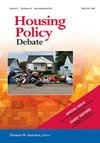气候变化、老龄化和幸福:居住环境如何重要
IF 2.8
3区 经济学
Q2 DEVELOPMENT STUDIES
引用次数: 3
摘要
摘要老年人的生活环境如何影响他们对气候变化的脆弱性?关于气候变化对老年人的生理影响,特别是严重高温发病率增加的危险,已经有很多报道。关于老年人的居住环境如何调节他们对气候压力源的暴露,他们对气候变化影响的特殊敏感性,或者他们应对极端事件或适应长期环境变化的能力,人们知之甚少。我们借鉴英语文献,重点研究与美国相关的工作,研究老年人生活的住房、社区、城市或农村环境如何影响他们的气候变化经历,调节他们对气候变化相关风险的暴露,对这些事件和趋势的敏感性,以及他们适应和恢复的能力。老年人面临着多种生活变化,这使得优先考虑气候变化更具挑战性。它们也是多样化的,具有不同的脆弱性、对风险的感知以及管理风险的能力。本文列出了一个议程,在该议程中,额外的研究可以为旨在降低老年人风险和建设适应气候变化能力的政策和规划工作提供信息。议程包括了解具体的脆弱性,以及老年人及其住房提供者已经在如何应对。本文章由计算机程序翻译,如有差异,请以英文原文为准。
Climate Change, Aging, and Well-being: How Residential Setting Matters
Abstract How do older people’s living environments influence their vulnerabilities to climate change? Much has been written about the physiological consequences of climate change for older individuals, particularly the dangers of increased incidence of severe heat. Less is known about how older people’s residential settings moderate their exposure to climate stressors, their particular sensitivities to the effects of climate change, or their capacities to respond to extreme events or adapt to long-term environmental changes. Drawing on literature in English, with a focus on work relevant to the United States, we examine how the housing, neighborhood, and urban or rural contexts in which older people live shape their experiences of climate change, moderating their exposure to risks related to climate change, sensitivity to those events and trends, and their capacities to adapt and recover. Older people face multiple life changes, making prioritizing climate readiness more challenging. They are also diverse, with different vulnerabilities and perceptions of risks and the ability to manage them. This paper lays out an agenda where additional research can inform policy and planning efforts aimed at reducing older individuals’ risk and building the capacity to adapt to climate change. The agenda includes understanding specific vulnerabilities and how older people and their housing providers are already responding.
求助全文
通过发布文献求助,成功后即可免费获取论文全文。
去求助
来源期刊

Housing Policy Debate
Multiple-
CiteScore
5.40
自引率
17.20%
发文量
68
期刊介绍:
Housing Policy Debate provides a venue for original research on U.S. housing policy. Subjects include affordable housing policy, fair housing policy, land use regulations influencing housing affordability, metropolitan development trends, and linkages among housing policy and energy, environmental, and transportation policy. Housing Policy Debate is published quarterly. Most issues feature a Forum section and an Articles section. The Forum, which highlights a current debate, features a central article and responding comments that represent a range of perspectives. All articles in the Forum and Articles sections undergo a double-blind peer review process.
 求助内容:
求助内容: 应助结果提醒方式:
应助结果提醒方式:


